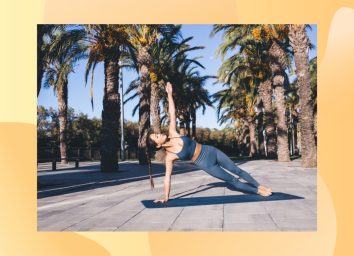Simple At-Home Exercises To Boost Your Metabolism, Trainer Says
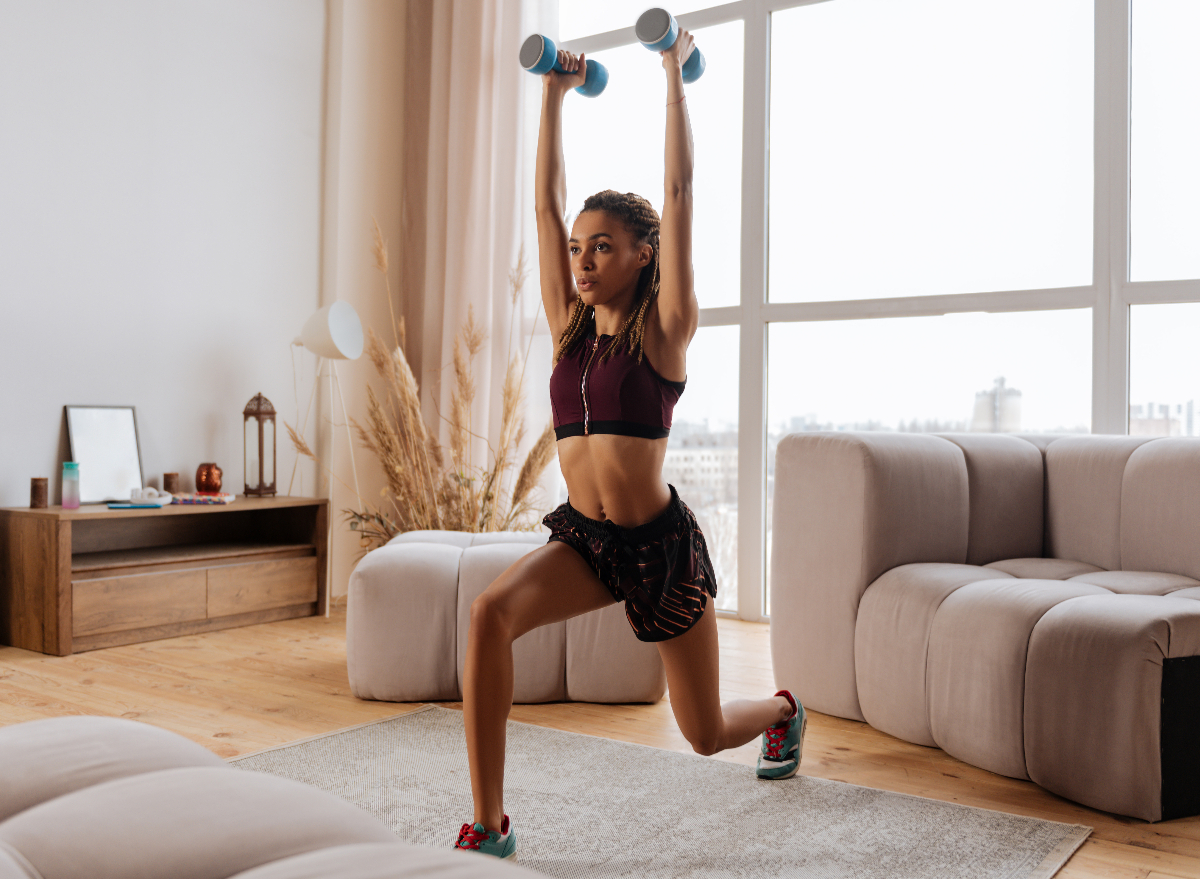
Working out and seemingly getting nowhere fast can be pretty frustrating—especially as you age and your metabolism feels sluggish. We've all been there, which is why you need some sneaky tweaks you can do to help get your metabolism going. We're here with a few simple at-home exercises to boost your metabolism, according to an expert. The best part is, you don't have to leave the comfort of your home in order to reap the benefits of a solid fitness session. Keep reading to learn more, and next, don't miss 5 Simple At-Home Exercises To Stay in the Best Shape.
There are several parts to your metabolism.
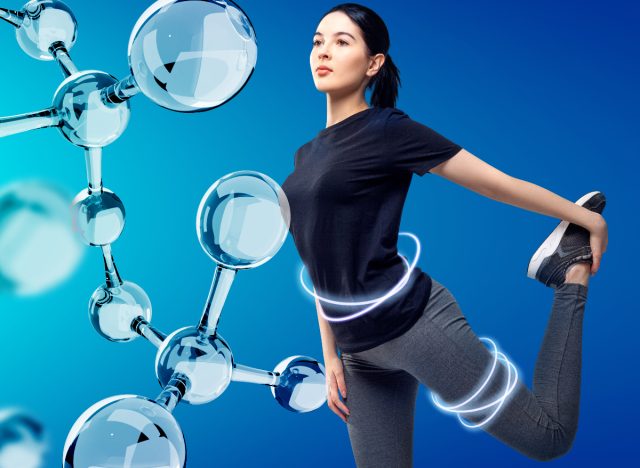
Eat This, Not That! spoke with Mike Bohl, MD, MPH, ALM, the Director of Medical Content & Education at Ro, a certified personal trainer, and a member of our Medical Expert Board, who explains there are four parts to your metabolism.
- Your basal metabolic rate (resting metabolic rate) is the energy you burn while resting. It keeps your cells alive and helps your body function properly.
- The second component is the thermic effect of food. This is the amount of energy you require to digest any items you eat.
- Component number three is called non-exercise activity thermogenesis. This is the energy you torch in order to perform daily tasks.
- The fourth part of metabolism is exercise activity thermogenesis, which is the energy you burn while doing structured exercises, such as lifting weights or going on a run.
How does exercise speed up your metabolism?
Exercise is integral in speeding up your metabolism in a few ways, Dr. Bohl explains:
- "First, in order to perform any movement, your muscles need to contract—and this takes energy. So whether you're swimming or doing bicep curls or sit-ups, your muscles are taking in fats and sugars and burning them for energy in order to do work. This directly increases your exercise activity thermogenesis."
- "Second, after a workout, your muscles need to relax and recover. The process of repairing your muscles and growing them back also takes energy. In other words, you continue to burn additional calories even after you're finished working out."
- "Third, it takes more energy to sustain muscle mass than to sustain fat mass. So even if you're not actively exercising, simply having more muscle mass increases your basal metabolic rate, because your body needs to burn more energy to keep the muscle cells alive."
Everyone's metabolism is different and has to do with several factors. Your body composition, genetics, gender, and age all play a role in your personal metabolic rate. There are several simple tricks that may jumpstart your metabolism momentarily, including eating spicy food or having some caffeine to drink. Your metabolism is an involved process, however, and according to Dr. Bohl, you'll most likely only have the ability to change it to a certain extent.
Here are 3 at-home exercises to boost metabolism.
But fear not, because Dr. Bohl offers several at-home exercises you can easily work into your regular routine. The best part is, you don't have to leave the house! Get ready to kick things up a notch and torch more calories in less time.
Start jogging; it's a healthy, full-body workout.
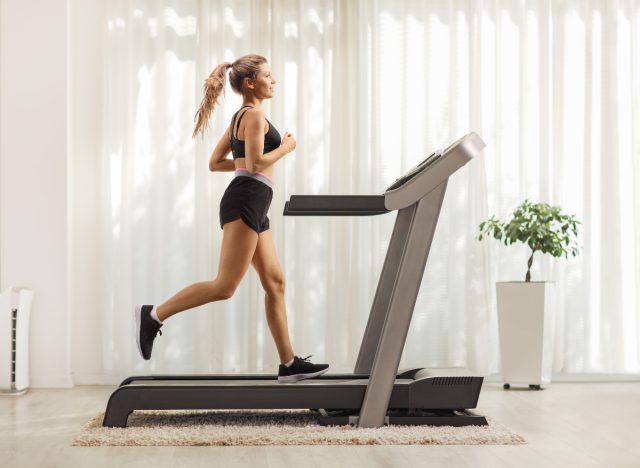
Hop on the treadmill, and start jogging! Dr. Bohl starts off by suggesting an excellent full-body workout that will torch some serious calories, and it's jogging. Jogging will make a great difference when it comes to your metabolism while improving your blood flow and strengthening your heart.
Dr. Bohl suggests, "If it's a rainy day, any cardio exercise you can do at home that increases your heart rate and breathing rate is beneficial here—for example, you can do jumping jacks."
Focus on large muscle groups, like your legs and buttocks, by doing squats and lunges.
Focusing on your larger muscle groups is an extraordinary way to burn up calories in a limited amount of time. "The muscles in the buttocks and legs are among the largest in the body, so exercises that target these are a good place to start. Squats and lunges are two different exercises that work muscles in the thighs, buttocks, calves, and—to a lesser degree—the abs, lower back, and other core muscles. To level up the exercise and burn even more calories, you can consider adding weight to these exercises, such as by holding small dumbbells in your hands while squatting or lunging," Dr. Bohl explains.
Do some closed-chain exercises, like pushups and pull-ups, to get a solid upper-body workout.
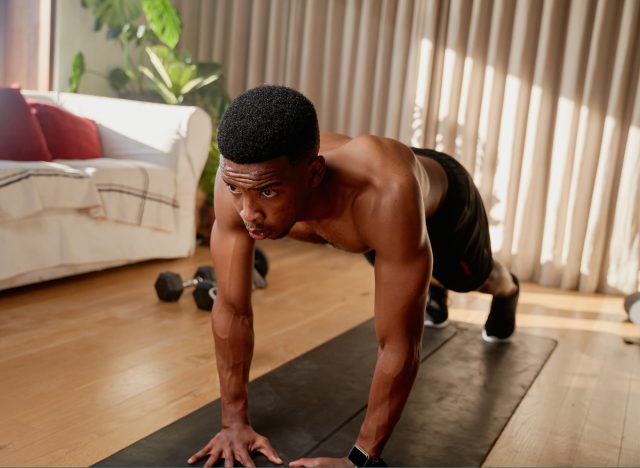
You can also burn higher calories with a solid upper-body workout. Dr. Bohl recommends doing closed-chain movements, which are commonly performed against a bar or on the floor. These exercises are so beneficial and work your entire body rather than just a few smaller muscles.
Dr. Bohl suggests, "The first closed-chain exercise that targets the upper body and is easy to do at home is pushups. Pushups work the arms and the front of the torso. And if you have yoga blocks or a sturdy bench, you can add variety to your pushup routine, by doing incline and decline pushups, as well. And the second closed-chain exercise to do is pull-ups. Pull-ups work the arms and the back of the torso, and they can also be varied based on how far apart you keep your hands."


